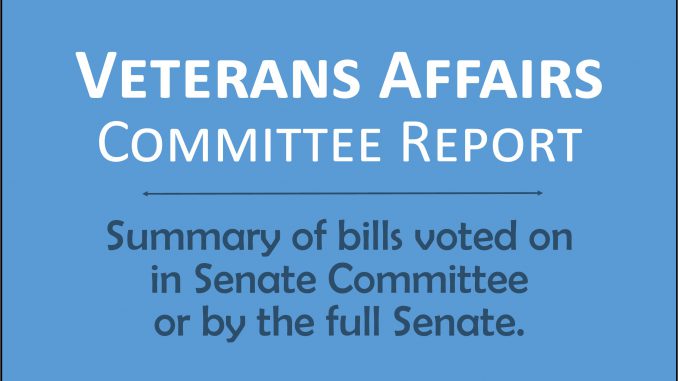
SF 64 – Missing Veterans- at- Risk alert program
HF 288 – Injured veterans grant parameters; professional licensure
FLOOR ACTION:
SF 64 – Missing Veterans- at- Risk alert program
SF 64 is based on a “green alert” to help find missing veterans or service members in Iowa. It requires Iowa Homeland Security to provide for use of the Iowa mass notification and emergency messaging system to notify the public in such a circumstance.
An “endangered missing person” is defined a person of any age who is missing and may be in danger because of the person’s age or physical or mental health, or due to severe weather conditions; and who may be unable to return to safety without assistance. The legislation specifies that this includes without limitation a military veteran or active-duty member of the U.S. Armed Forces, Reserve or National Guard who has a service-related physical or mental health condition and who may be missing as a result of that condition.
[3/25: 50-0]
HF 288 – Injured veterans grant parameters; professional licensure
HF 288 (SF 512) is an Iowa Department of Public Defense recommendation. Currently, Iowans serving in the Iowa National Guard, Reserve or regular component of the U.S. Armed Forces who are deployed overseas and seriously or very seriously injured in the line of duty while in a combat zone or hazardous duty pay zone are eligible to apply for an Injured Veterans Grant. In recent years, the Department of Defense has categorized some areas as “Overseas Contingency Operations,” including Kuwait, Kosovo and Djibouti.
The legislation modifies eligibility to allow those deployed in any region outside of the United States who are injured and evacuated to be eligible to apply for a grant while the injured veteran is hospitalized or receiving medical care or rehabilitation services authorized by the military. The Legislature established the program beginning in 2007, retroactive to September 11, 2001. Grants are paid in increments of $2,500 up to a maximum of $10,000. Most receive $2,500 to help family in the first month when the service member is medically evacuated to a hospital. Additional money may be given for longer periods (30 days, 60 days and 90 days) of hospitalization, medical treatment and rehabilitation services by the military or Veterans Administration.
The proposal also establishes an expedited licensing process for spouses of active duty members of the U.S. military who are stationed in Iowa. It provides that licensing boards establish provisional licensing procedures by January 1, 2020 to expedite the licensing of an individual who is licensed in a similar profession or occupation in another state and who is the spouse of an active duty member of the U.S. military. The secretaries of the U.S. Navy, Air Force and Army are asking governors and legislators in all states to adopt such guidelines.
The Iowa Department of Veterans Affairs, the Commission of Veterans Affairs and the National Guard will collaborate on a study regarding the sustainability of future funding for the injured veterans grant program with a written report due to the Governor and Legislature by December 31, 2019. The House passed HF 288 on a vote of 96-0.
[3/21: 46-0 (Absent: Bisignano, Celsi, R. Taylor; Vacant: Danielson)]
